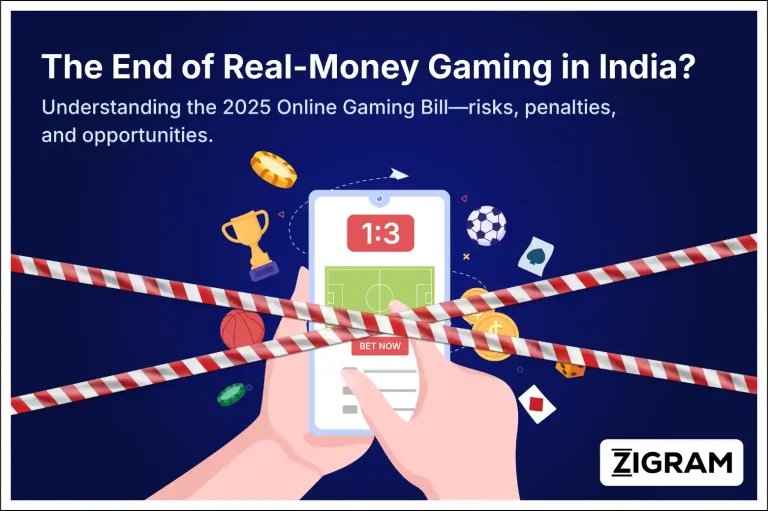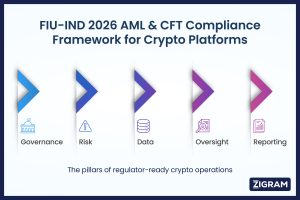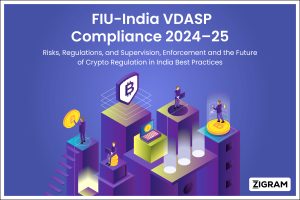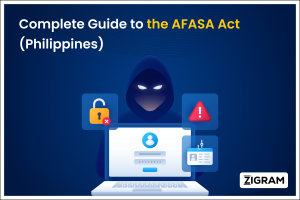Table of Contents
In March 2025, India’s online gaming industry hit its cultural peak when Dream11, the fantasy sports giant, launched star-studded campaigns featuring Aamir Khan, Ranbir Kapoor, and cricket icons like Rohit Sharma and Rishabh Pant. These high-energy ads racked up millions of views, helping real-money gaming (RMG) apps enter mainstream Indian households and become part of popular culture. [1] [6]
By 2024, RMG had already captured 85.7% of India’s online gaming revenues, generating INR 27,438 Cr (USD 3.2 billion), with projections to touch INR 62,840 Cr (USD 7.28 billion) by 2029. The mix of celebrity endorsements, Indian Premier League (IPL) integration, and accessible mobile platforms transformed RMG into one of the fastest-growing segments of the digital economy. [2] [12]
Yet alongside this meteoric rise came growing concerns. Policymakers, industry experts, and civil society began debating the social risks of RMG – from addiction and financial stress to regulatory gaps. This culminated in the Promotion and Regulation of Online Gaming Bill, 2025, which introduced a sweeping ban. At its core, the dilemma remains: is the government safeguarding citizens from potential harms, or is it overstepping into personal freedoms? [3] [4] [5] [7]

The Dark Side: Losses, Fraud, Addiction, and AML Vulnerabilities
Behind the hype lies a worrisome landscape:
Financial Losses & Bankruptcy
Reports cite 45 crore users losses amounting to INR 20,000 crore, with families and individuals sinking into debt as addiction spiralled out of control. [2] [6] [14]
Scams & Fraud
Unregulated apps while some outright scams, others entice users with feigned “guaranteed wins”. Fake platforms and rigged results created a massive consumer fraud issue. [6] [14]
AML Loopholes
Real-money gaming platforms lacked rigorous anti-money laundering (AML) controls. Illicit funds, black-money, and even terror financing were routed through game wallets. Press reports highlighted terror funding as a key government concern behind the crackdown. [8] [13]
Addiction & Mental Health
Policymakers likened gaming addiction to substance abuse. Karnataka’s Home Minister warned that online gaming—bolstered by aggressive ads—could be “more damaging than drugs.” The state recorded 347 betting cases between 2023 and July 2025 alone. [9] [14]
This tangled web of addiction, financial ruin, fraud, and criminal exploitation prompted the government to take immediate action.
Enter the Promotion and Regulation of Online Gaming Bill, 2025
The government took a bold leap: on August 21, 2025, the Lok Sabha passed the Promotion and Regulation of Online Gaming Bill, 2025, aiming to uproot the real-money gaming model, while fostering safe and skill-based gaming. [5] [7] [10]
Key Features & Provisions
India’s New Regulatory Framework for Online Betting Oversight
- Establishment of a central regulator (Online Gaming Authority or National Online Gaming Commission) under MeitY, tasked with licensing, classification, monitoring, and complaint redressal. [5] [7] [10]
- Uniform national standards replace fragmented state regulations, echoing GST-style harmony. [5] [10]
Classification of Allowed and Prohibited Games Under the 2025 Law
Allowed:
E-sports—formally recognised as competitive sports. The Ministry of Youth Affairs & Sports will roll out training academies, research centers, and tournaments. [11] [12]
- Social and educational games—non-monetary games for learning or cultural purposes, promoted through campaigns. [5] [10]
Prohibited:
- All forms of real-money games—fantasy, rummy, poker, lotteries—all banned outright, regardless of skill content. [5] [10]
Financial Restrictions and AML Safeguards in Betting Apps Regulation
Penalties and Enforcement Actions for Illegal Betting Platforms
Offense |
Penalty |
|
Hosting/Facilitating money games |
Up to 3 years jail and/or INR 1 crore fine |
|
Advertising or promoting money games |
Up to 2 years jail and/or INR 50 lakh fine |
|
Financial facilitation |
Similar to hosting |
|
Repeat offenses |
Up to 5 years jail and/or INR 2 crore fine |
|
Enforcement |
Officers can search, seize, arrest (sometimes without warrant) and block platforms under IT Act |
Corporate accountability is central: company executives—unless demonstrably uninvolved—are personally liable. Independent directors are exempt if they had no decision-making role. [10]
Timeline & Legislative Process
- Introduced in Lok Sabha: 20 August 2025
- Passed by Lok Sabha: 21 August 2025 (alongside Rajya Sabha and presidential assent), becoming law swiftly, with minimal debate. [5] [7] [10]
- Government justified speed citing social harms; critics called it hasty and lacking stakeholder consultation. [5] [7] [10]
Real-World Fallout: Industry & User Response
- Industry Scale & Financial Implications: The regulated gaming sector contributed INR 20,000 crore in taxes and supported over 200,000 jobs, but runs the risk of upheaval under the ban. Industry bodies (AIGF, EGF, FIFS) warned of massive fallout: 2 lakh jobs at risk, INR 31,000 crore revenue, INR 25,000 crore FDI, and 50 crore gamers impacted. [2] [3] [6]
- Stock Market Ripples: Shares of online gaming app service providers like Nazara Technologies and Delta Corp fell by up to 7% on news of regulation approval. [6] [14]
- Law Enforcement Intensifies: The Enforcement Directorate raided 30 locations across six cities, including venues linked to illegal betting and money laundering, within days of the Bill’s passage. [8] [13]
- Industry Shift:
- Platforms like Dream11 and MPL reportedly paused cash-based contests, sponsorships, and explored pivoting to e-sports, gamified learning, or overseas operations, even as extraterritorial provisions may limit such choices. [6] [11]
- Calls for Reform vs. Ban:
- Legislators and industry leaders voiced concern about the abrupt ban. Congress MP Shashi Tharoor urged select committee review and public consultation, calling legalization and taxation a more balanced path. [5] [7] [10]
Ethical Dilemma: Protecting Citizens vs. Policing Freedom
Arguments for Protection
Public Health Priority: Address addictive behaviors causing real harm which are comparable to regulating tobacco or alcohol. [9] [14]
Financial Safeguard: Shield families from being lured into ruin by addictive platforms. [6] [14]
AML & National Security: Eliminates channels that enable terror financing and money laundering. [8] [13]
Systemic Integrity: Reinforces trust in digital finance and protects youth. [5 ] [8]
Arguments for Personal Freedom
Autonomy: Adults argue for freedom to engage in money-based games responsibly. [5]
Economic Impact: The ban threatens jobs, investment, and innovation in gaming that could drive operations offshore. [2] [3]
Regulatory Overreach: Some see blanket prohibition as extreme; controlled regulation, higher taxation, and licensing could be more balanced. [5] [7] [10]
Slippery Slope?: Today’s ban on money games might evolve to restrictions on other high-risk apps (like stock trading or gambling-related forms) under similar logic. [5]
Conclusion: The AML Opportunity and Path Ahead
The Promotion and Regulation of Online Gaming Act, 2025 marks a dramatic intervention with an effort to dismantle a harmful, unregulated digital betting environment while boosting responsible, skill-based gaming and e-sports. [5] [7] [10]
But the underlying lesson transcends gaming. With robust AML frameworks, governments can safeguard citizens, curb criminal flows, and ensure financial transparency without hamstringing innovation. Businesses, in turn, gain credibility, stability, and investor confidence through compliance. [5] [8] [13]
India now stands at a crossroads: Will it manage a calibrated reinvention of its digital gaming economy with AML as the common ground between liberty and security or see players migrate to the shadowy offshore fringe? [5] [8]
As the dust settles, this regulatory gamble may yield one of two outcomes:
A healthier, transparent, innovation-led gaming ecosystem. [5] [11]
- Or, a diminished industry pushed to the margins along with the very talent and opportunity India seeks to preserve. [2] [3] [6]
Bibliography
1) “India plans to ban online games played with money, citing addiction risks” – (Reuters)
2) “India passes bill banning money-based online games, app shutdowns loom” – (Reuters)
3) “Lok Sabha passes online gaming bill: Why Centre is keen on regulating sector” – (The Times of India)
4) “Online Gaming Bill 2025 explained: India backs e-sports, cracks down on money games with strict penalties” – (The Times of India)
5) “IT Secretary clears air on gaming ban, shines light on what lies ahead” – (The Economic Times)
6) “India’s Dream11 in talks to end cricket sponsorship due to new gaming law” – (Reuters)
7) “Promotion and Regulation of Online Gaming Bill, 2025 – PIB” (Press Information Bureau)
8) “Everything You Need To Know About Online Gaming Bill 2025” – (www.ndtv.com)
9) “Lok Sabha clears Online Gaming Bill, proposes to ban real money games” – (The Economic Times)
10) “Winners and Losers: India’s Online Gaming Bill Elevates E-Sports…” – (India Briefing)
11) “Boost for e-sports, ban on real-money games: Key features of Online Gaming Bill” – (India Today)
12) “India’s online gaming sector may cross Rs. 77,688 crore (US$ 9 billion) by 2029″: Report” – (IBEF)
13) “Terror funding angle complicates the case for real-money gaming companies” – (The Economic Times)
14) “Home minister calls addiction to online gaming worse than drugs, govt plans fresh curbs” – (The Times of India)
- #GENIUSAct
- #Stablecoins
- #AML
- #FinancialCrime
- #Compliance
- #CryptoRegulation
- #FinCEN
- #SanctionsCompliance
- #RegTech
- #AntiMoneyLaundering
- #DigitalAssets
- #FinancialSecurity







